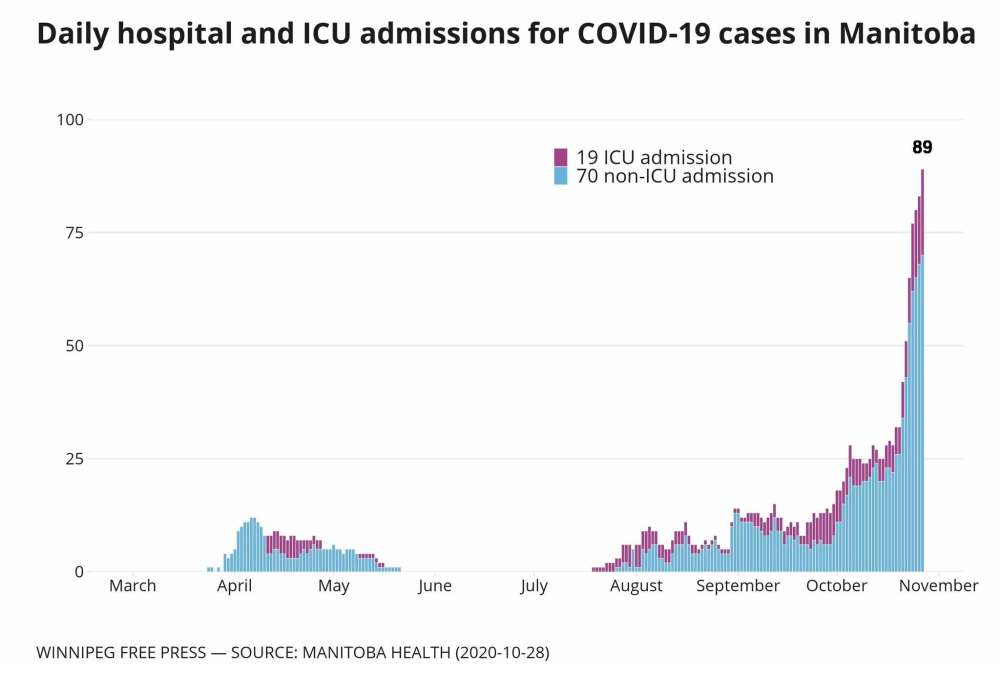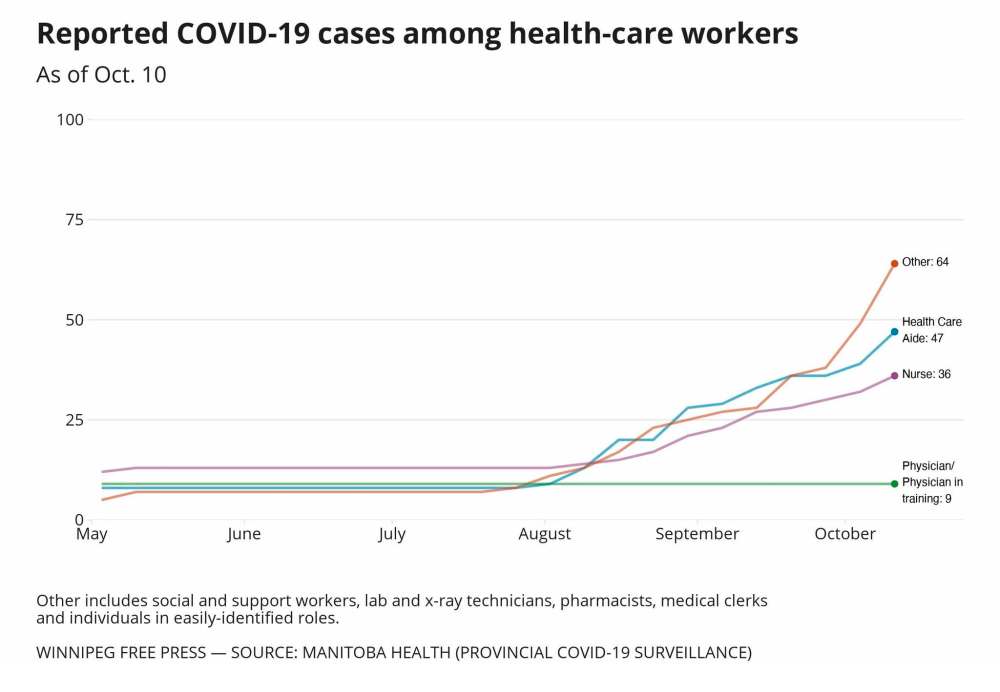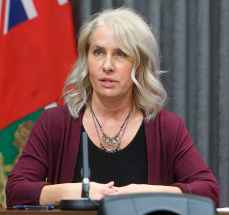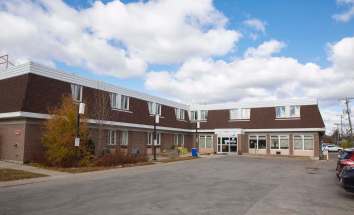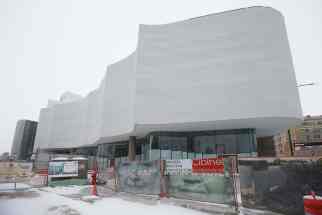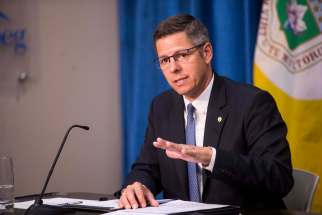Death toll hits 61 Winnipeg close to ICU capacity, surgeries cancelled as cases rise
Read this article for free:
or
Already have an account? Log in here »
To continue reading, please subscribe:
Monthly Digital Subscription
$19 $0 for the first 4 weeks*
- Enjoy unlimited reading on winnipegfreepress.com
- Read the E-Edition, our digital replica newspaper
- Access News Break, our award-winning app
- Play interactive puzzles
*No charge for four weeks then billed as $19 plus GST every four weeks. Offer only available to new and qualified returning subscribers. Cancel any time.
Read unlimited articles for free today:
or
Already have an account? Log in here »
Hey there, time traveller!
This article was published 27/10/2020 (1529 days ago), so information in it may no longer be current.
Only six intensive-care beds were available in Winnipeg Wednesday as the spike in COVID-19 cases further taxed the hospital system, forced health-care workers into self-isolation and required the cancellation of 43 surgeries.
The province reported three additional deaths — raising the death toll to 61 — and 170 new cases, the third-highest daily tally of the pandemic.
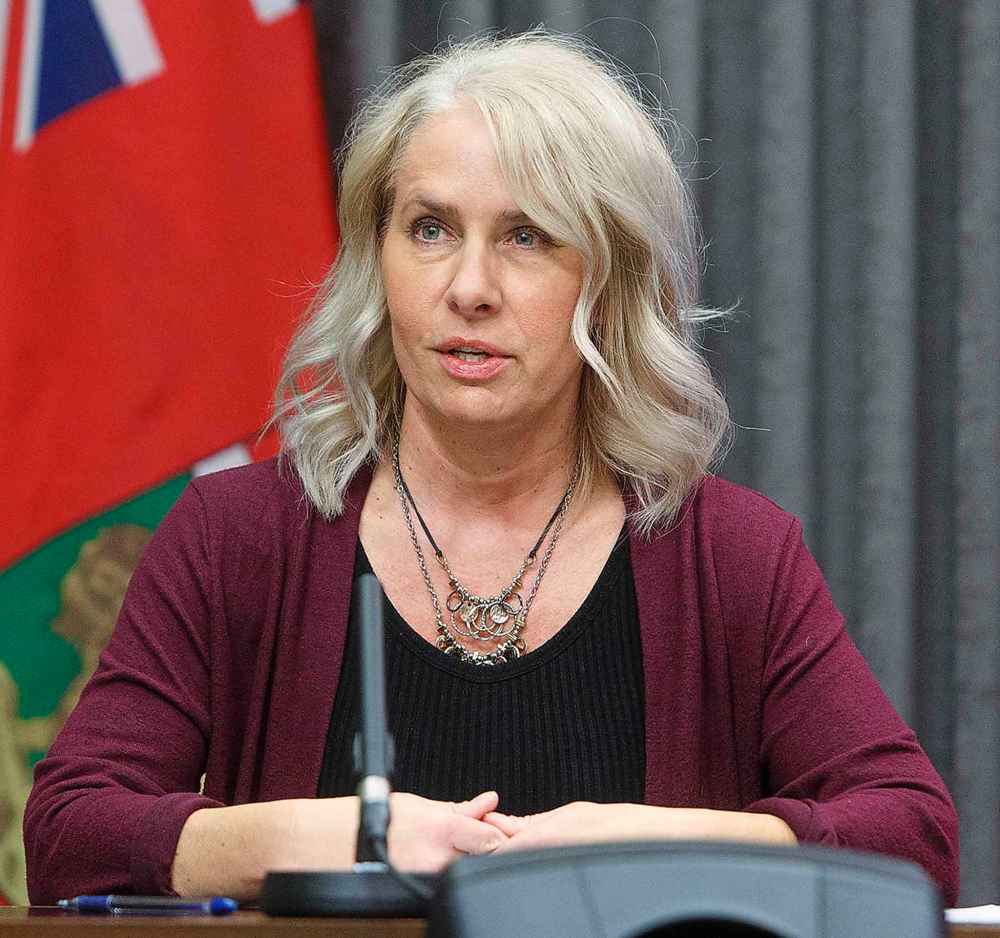
Lanette Siragusa, chief nursing officer with Shared Health, said intensive care unit capacity on Wednesday was at 92 per cent, and continues to be stretched, as more people become sick with COVID-19 and hospital outbreaks swell.
“The way the numbers are going, we do expect that critical care is going to continue to be congested,” Siragusa said at a news conference. “If we have to go over capacity, we already are looking at what those models of care would be and how we would support patients.
“We’re not going to be denying any patient care. We’re going to figure out the solutions.”
Siragusa said if triple-digit daily increases in new cases continue, health care workers may be redeployed and services cut back within days to handle the surge in demand.
“We’re not going to be denying any patient care. We’re going to figure out the solutions.”
– Lanette Siragusa, chief nursing officer with Shared Health
On Wednesday, 89 COVID-19 patients were in hospital, including 19 in intensive care. She noted 35 people were hooked up to a ventilator, though not all were COVID-19 patients.
Meanwhile, St. Boniface Hospital has cancelled dozens of general and cardiac surgeries due to COVID-19 exposures in the operating room and among critical-care team members.
Hospital outbreaks
St. Boniface Hospital: 10 staff, 23 patients, includng four deaths
Victoria General Hospital: 19 staff, 21 patients
No other hospitals have reported outbreaks.
The hospital has declared an outbreak of the virus in three units. At least 10 staff and 23 patients have tested positive. Four patients have died. Victoria General Hospital has an outbreak on two family medicine units involving 21 patients and 19 staff.
In all, 43 surgeries have been cancelled, Siragusa said, as staff members are forced to self-isolate or have tested positive for the disease.
“Our capacity is dwindling in critical care,” she said. “There is capacity in the system but I understand it is more compressed at St. Boniface because of staffing issues.”
In Winnipeg in the past two weeks, Siragusa said health-care workers have been off sick for 91,000 hours, or 5.81 per cent of all hours worked.
She was unable to say how many staff members are in self-isolation due to having symptoms or being exposed, but it is significant.
As of Wednesday, 37 health-care workers were considered active COVID-19 cases (half of the staff acquired the virus through close contact) and 32 work in Winnipeg.
Siragusa said Shared Health has made headway in adding more health-care workers to the system and continues to recruit candidates and shift staff to backfill for those taken out of rotation.
As of Oct. 18, the vacancy rate for nurses was down to 14.5 per cent from 16 per cent last year (which represents 115 positions filled) and critical care nursing vacancy was 11 per cent, down from 20 per cent at the same time last year.
“In terms of vacancies, critical care hasn’t really looked this good in a long time,” she said. “With people who are having to go home, if they’re close contacts or COVID-positive, certainly that absenteeism is what’s really impacting us right now.”
Manitoba Nurses Union president Darlene Jackson said a persistent nursing vacancy rate around 15 per cent is not acceptable, nor a cause for celebration.
“If they’re serious about addressing this issue, they need to do something tangible with recruitment and retention,” Jackson said, adding the number of new nurses coming into the system is a drop in the bucket.
“There’s really been no investment in recruiting. If you look to our neighbour to the east, Ontario has spent $50 million to recruit health-care professionals. They’ve offered wage top-ups, they’re doing everything they can to get every person available working. Manitoba has done nothing of this,” she said.
To keep staff on the schedule, the province has started a pilot project to rapidly test symptomatic health-care workers so they can get back on the job if they don’t have COVID-19, Siragusa said.
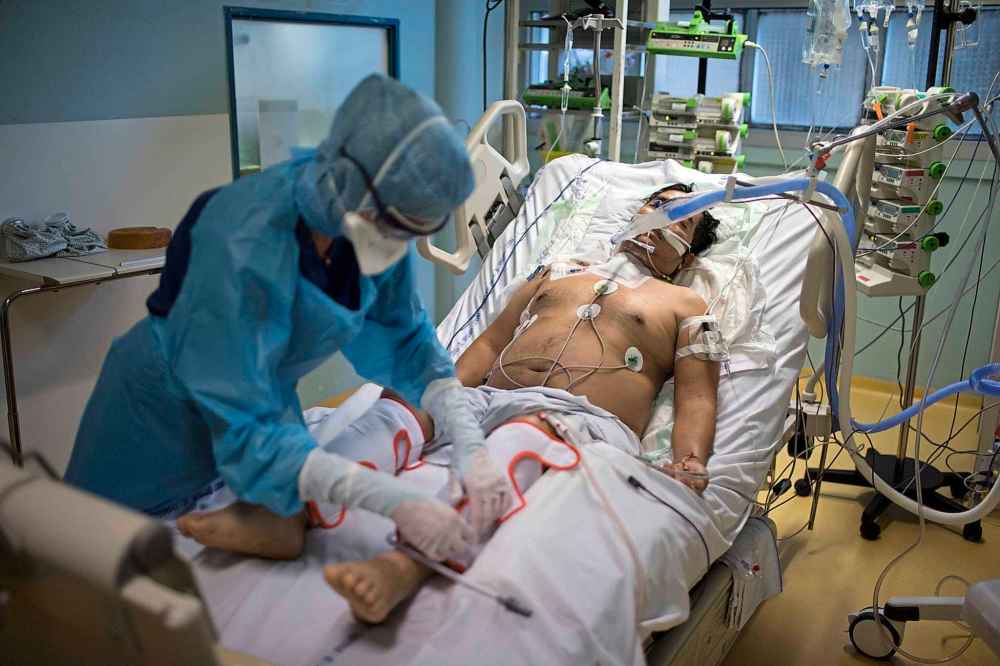
“There’s really been no investment in recruiting… Ontario has spent $50 million to recruit health-care professionals. They’ve offered wage top-ups, they’re doing everything they can to get every person available working. Manitoba has done nothing of this.”
– Manitoba Nurses Union president Darlene Jackson on nursing vacancies in the province
At Health Sciences Centre, 150 health-care workers who had symptoms were recently tested using a Rotor-Gene test, which provides results in four to six hours. Four of them tested positive for COVID-19, and the remaining 146 were cleared to go back to work with prescribed personal protective equipment.
“We do continue to have beds, and equipment and supplies, but our most precious resource right now is our staff,” Siragusa said.
St. Boniface Hospital statement
St. Boniface Hospital has had to postpone general and cardiac surgeries due to potential COVID-19 exposure of our operating room and critical care teams, who, as a result, are required to be off work for 14 days.
We have worked closely with the Regional Surgery Program to avoid as many postponements as possible.
St. Boniface Hospital has had to postpone general and cardiac surgeries due to potential COVID-19 exposure of our operating room and critical care teams, who, as a result, are required to be off work for 14 days.
We have worked closely with the Regional Surgery Program to avoid as many postponements as possible.
Non-urgent or elective surgery requiring inpatient admission are being postponed. We have reached out to patients whose surgery is affected.
Surgeries will be prioritized for urgent/emergent cases, inpatients waiting in hospital, cardiac and cancer patients, and previously cancelled patients.
We are monitoring the situation daily to minimize the impact on our patients awaiting surgery.
Debbie Boissonneault, Canadian Union of Public Employees Local 204 president, said the update provided by Siragusa was not reassuring. The efforts to recruit, retain and support workers come too late and don’t go far enough, she said.
“People are burning out,” Boissonneault said. “When you’re short, it’s hard on them and very tiring. They want to do their job, they want people to be there with them supporting them, and they just don’t feel like they’re getting that.”
She said the process to clear health-care workers to return to work is cumbersome and inefficient, and results in staff remaining off work longer than necessary.
“The government needs to make health care something that people want to do again. They want to train people and bring people in, but the people actually working in the system want out,” Boissonneault said.
danielle.dasilva@freepress.mb.ca

Our newsroom depends on a growing audience of readers to power our journalism. If you are not a paid reader, please consider becoming a subscriber.
Our newsroom depends on its audience of readers to power our journalism. Thank you for your support.
History
Updated on Wednesday, October 28, 2020 6:50 PM CDT: Adds factbox
Updated on Wednesday, October 28, 2020 8:39 PM CDT: Adds second factbox

